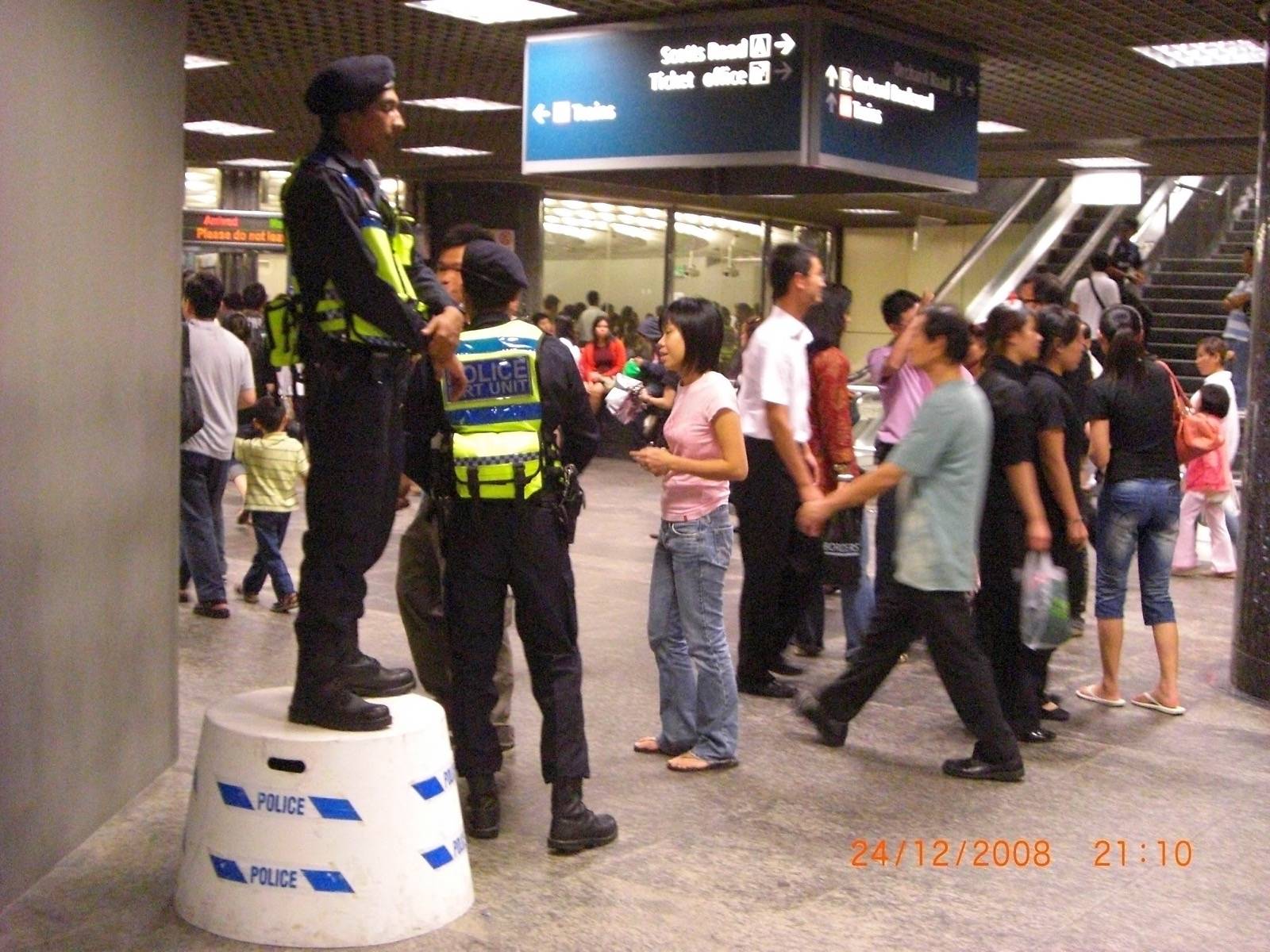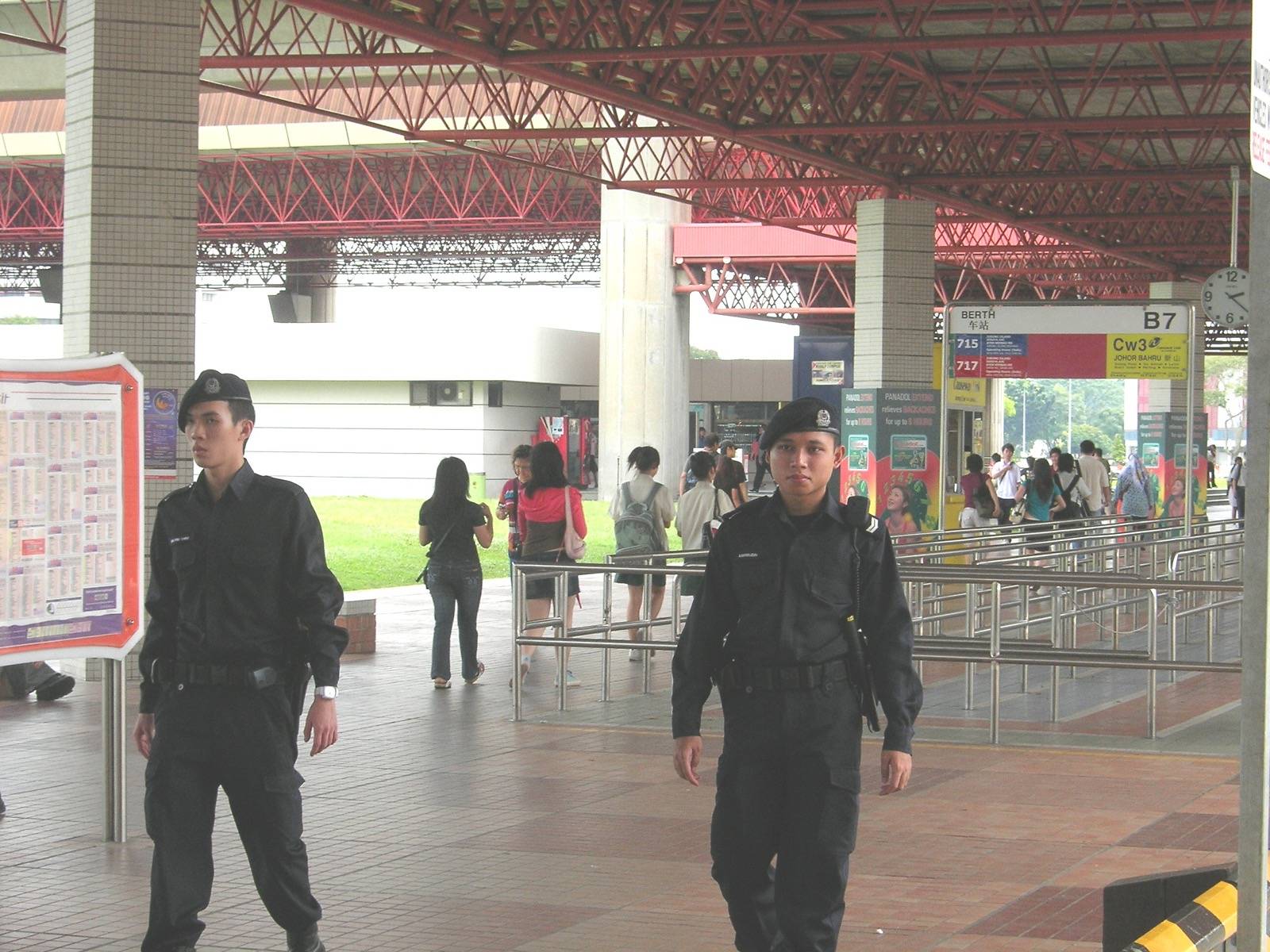SINGAPORE: On MRT trains and at the stations, it is hard to miss police officers from the Public Transport Security Command (TransCom).
They wear neatly-pressed long-sleeved uniforms and grey berets, and patrol in groups of three or four while scanning the crowds. They are trained to spot and screen suspicious characters to nip crime in the bud.
But TransCom commander Assistant Commissioner of Police (AC) Koh Wei Keong, 48, told reporters on Tuesday (Nov 26) that his officers are not out to get you for nothing.
“We must have reasonable suspicion that you have committed an offence. We do not just go out and check,” he said. “Some of them may not be very smiley, but if you have not committed anything, there’s no reason to fear any of the TransCom officers.”
Indeed, AC Koh said his officers were trying to be friendlier as they ask commuters to do more to help fight crime on public transport, amid a dwindling pool of full-time national servicemen officers and an increasing number of MRT lines and stations.
“We wanted the community to be with us,” AC Koh added. “So, we also taught our guys that you need to be more discerning. You know when you need to be stern.
“But on the other hand, you also need to know when you need to be more engaging and friendly with the community. Because overall, you need the community to be with us in order for us to do our job well.”
FROM COUNTERTERRORISM TO COMMUNITY
To understand how this shift came about, you have to go back to 2005, when TransCom’s predecessor the Police MRT Unit (PMU) was set up as a counterterrorism force in Singapore. Its officers patrolled the MRT network, acting as a visible and deterrent presence.
This was in response to the London bombings on Jul 7 that year, when terrorists blew up homemade bombs aboard three underground trains and a double-decker bus, killing 52 people and injuring more than 700.
The threat of public transport networks becoming terrorist targets had suddenly become very real, and so being in the PMU was a serious business.
“When we first set up, it was in response to the terrorist attacks, so the stance was very different,” AC Koh said. “At the time, the demeanour could be a bit sterner.”
Assistant Commissioner of Police Koh Wei Keong (front) leading his charges. (Photo: Aqil Haziq Mahmud)
In 2009, PMU was enlarged to become TransCom, a specialist independent unit. And as the years went by, its officers – more than three-quarters made up of full-time national servicemen (NSF) – started to tackle more usual types of crime, like drug abuse, theft and molestation. Officers were even helping commuters find their way or their lost friends.
The latest phase of TransCom’s evolution from a primarily counterterrorism unit to a hybrid, community-based force came this year during its 10th anniversary, when it launched an initiative in July to get commuters to be an extra set of eyes and ears.
READ: New initiative engages commuters as first responders to potential threats on public transport
After all, TransCom’s 600 officers patrol more than 100 MRT stations that see almost 7 million passenger trips a day. Those statistics mean that there are manpower challenges.
Under the Riders on Watch (ROW) initiative, TransCom officers would approach commuters about signing up as a volunteer. They would then get police text messages on suspects, and help keep a lookout for suspicious characters or objects.
“NO QUOTA FOR CHECKS”
Still, there have been challenges along the way.
When a photo of TransCom officers speaking to two madrasah students was circulated online, netizens questioned if the officers were screening the students because they had a quota to meet.
In July, police rejected the allegations as “untrue and irresponsible”, pointing out that the officers were talking to the students about joining the ROW initiative, adding that comments that seek to stir up racial sentiments were unhelpful and uncalled for.
AC Koh (middle) having a discussion with his officers. (Photo: Aqil Haziq Mahmud)
“Let me state this: We have no quota for checks,” AC Koh said on Tuesday.
“We taught officers that if you check on people, it’s based on suspicious behavior. If you exhibit certain tell-tale signs, we will check. Other than that, if you see a family and all, it’s okay for you to speak to them and encourage them to sign on (for the ROW initiative).”
READ: Police reject ‘irresponsible’ allegations about checks on madrasah students
AC Koh said TransCom officers are trained to engage people and make small talk, but also to read body language and be quick-witted.
“If you need to be stern and check people, what are the legal powers, the unarmed tactics and all these that come in,” he added. “We do teach our officers a wide range of skills so that they can be effective on the ground.”
STOPPING MOLEST
On the ground, TransCom has been effective in tackling a common scourge on public transport: Molestation. While such incidents on public transport rose in 2017, police statistics showed a dip in 2018.
AC Koh attributes this to a change in deployment tactics. The unit knew that “hotspots” for MRT molests include crowded interchange stations. So during the morning rush hour, it deployed more officers at stations that came before these interchanges.
“What we did was to shore up the presence upstream,” AC Koh said, highlighting the need to create both reassurance and deterrence for commuters and criminals, respectively. “So whether you’re a potential perpetrator or victim, you note the police presence.”
Riders on Watch volunteer Liew Jiagui (foreground), 30, once helped police detain a molest suspect after seeing him touch three women in less than five minutes. (Photo: Aqil Haziq Mahmud)
TransCom has also deployed more operationally-ready national servicemen to stop molest, which AC Koh said “is certainly one of the things that we are concerned about”.
“We hope that for next year, our role will serve as an even more effective deterrence in trying to keep all these various crimes in the public transport network down,” he added.
STARTING FROM SCRATCH
But TransCom did not immediately start off as an effective crime fighting unit.
In its early years, the PMU operated out of the Special Operations Command base in Queensway, which was not even near an MRT station, recalled Mr Andy Tan, 49, TransCom’s first commander. He is now director of the police’s Centre for Protective Security.
TransCom’s first commander Andy Tan (right) with AC Koh. (Photo: Aqil Haziq Mahmud)
Manpower was an issue too. Mr Tan only had about 100 officers, whom he quickly asked to map each station’s closed-circuit television (CCTV) cameras and exits.
“The underground environment is actually pretty complex,” he said. “Especially when a lot of subways are going to link to shopping malls and things like that. So you needed a more dedicated unit to better understand that terrain and know how to work within that context.”

TransCom officers used to wear luminous vests and stand on raised platforms for more visibility. (Photo: Singapore Police Force)
Once they found a new base near MacPherson MRT station, it was about getting CCTV feeds from the Land Transport Authority, working with the public transport operators and sharing their rest areas. The latter would sometimes bring challenges.
For instance, Mr Tan said there would be issues like something being used but not cleaned properly.
“The only time (TransCom officers) actually get to rest is when they have a meal or water break. Usually have to do it in the restricted area of the station. But that’s where the operator’s staff also rest,” he said.
“The guys patrol eight hours a day. And if you think about it, they can’t sit on a bench. They can’t even rest on one leg because somebody will complain that they’re not alert.”

TransCom officers also used to wear blue berets, but switched to grey ones in December 2009 so they could be easily spotted among the masses of dark-haired heads. (Photo: Singapore Police Force)
This intense public scrutiny in crowded places is something TransCom officers have to deal with every day.
“They don’t have it easy,” Mr Tan said, pointing out they cannot return to a patrol car while on duty, unlike conventional ground officers.
“You’re squeezing into a train or a station … if you stare at people too hard you’ll get a complaint. You want to check, kena complaint. Don’t check, also kena complaint. The officers really need to be on their best behaviour all the time.”
READ: Police slam ‘untrue, baseless’ allegations that checks at MRT stations target Malays
Then there is the challenge of constantly working on public holidays, when public transport is usually the most crowded, and remaining vigilant as hundreds of thousands of people stream through the stations.
“On the ground or even on the CCTV, all you see is just heads,” Mr Tan said, referring to a typical New Year’s Eve countdown crowd at a station like City Hall. “So, the joke we have is that a station is not crowded when you can see the floor of the station.”
BRAVING PUBLIC SCRUTINY
TransCom officer Special Constable (SC) Sergeant Edmund Tan, 23, knows what it’s like spending hours walking around while trying to be attentive.
“It’s actually very taxing; it drains you quite a lot,” the NSF, who has been with TransCom for about nine months, said.
“But if we slack off for two seconds and something happens, it’s not only on us. It might cost a life. So we have to be alert for every single second of our patrol.”
Special Constable Sergeant Edmund Tan (left) during a patrol on board an MRT train. (Photo: Aqil Haziq Mahmud)
SC Sergeant Tan also described the stress of always working in the public eye, although he admitted it’s something he’s gotten used to.
“Every member of the public is considered a camera themselves,” he added. “Anyone can just take out a smartphone, take a photo and put it on Facebook. And then our faces and TransCom’s image are all there.”
VOLUNTEERS DOING MORE?
AC Koh acknowledged the pressure his officers face, but stressed that the unit would defend them if they carry out their duties professionally. Their body-worn cameras with sound recording can also be used to investigate allegations.
These improvements in technology, like the use of data analytics and smart glasses to automatically pick out wanted persons from crowded spaces, also help alleviate the manpower crunch.
AC Koh said it’s impossible for TransCom officers to be everywhere all at once. (Photo: Aqil Haziq Mahmud)
But AC Koh still wants to do more with the community. TransCom is looking at holding townhall sessions with the ROW volunteers next year to find out how else they could contribute. This includes potential joint-patrols or contingency responses, where volunteers could for instance help evacuate an MRT station.
The commander also revealed that 26,000 people have signed up for the ROW initiative – the target was 3,000 by the end of the year – barely four months since its launch.
“We do have people out there who are keen to help us,” he said. “And just within these few months to get 26,000, which is actually bigger than the size of the Singapore Police Force, I thought it’s very encouraging.”




